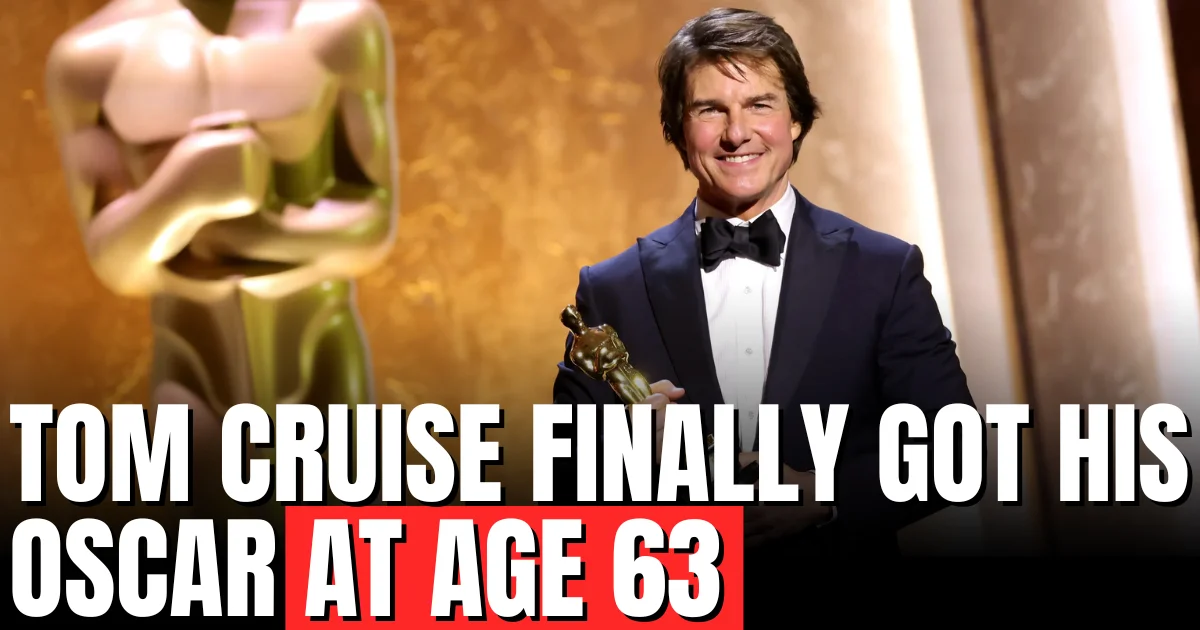Tom Cruise wins his first Oscar after decades in Hollywood. His emotional speech about filmmaking dedication and what this historic win means for cinema.
Table of Contents
Tom Cruise Wins First Oscar, Declares ‘Making Films Is Who I Am’ in Emotional Acceptance Speech
After four decades of delivering blockbuster performances and death-defying stunts, Tom Cruise finally received his first Academy Award. The 62-year-old actor’s emotional acceptance speech focused not on personal accolades but on his unwavering passion for filmmaking itself.
The historic win marks a turning point in Hollywood’s recognition of Cruise’s extraordinary contributions to cinema. His journey from box office superstar to Oscar winner reflects evolving industry perspectives on commercial success versus artistic achievement.
The Long Road to Oscar Recognition
Tom Cruise’s path to Academy Award recognition spans an impressive career filled with iconic roles, box office records, and critical acclaim. Despite numerous nominations and industry honors, the coveted Oscar statue remained elusive until now.
His filmography includes cultural touchstones that defined generations of moviegoers. From “Top Gun” to the “Mission: Impossible” franchise, Cruise built a reputation for commitment to authentic action sequences and compelling performances.
Career highlights leading to Oscar win:
- Three previous Oscar nominations for acting
- Consistent box office dominance across four decades
- Revolutionary action filmmaking techniques
- Critical acclaim for dramatic performances
- Industry respect for professional dedication
- Global influence on cinema culture
Hollywood observers long debated why Cruise hadn’t received Oscar recognition despite obvious talent and influence. Some suggested Academy voters undervalued commercial success while others noted fierce competition in crowded categories.
The Oscar-Winning Performance
Cruise received the Academy Award for his performance in a dramatic role that showcased depth beyond his action hero persona. The character required emotional vulnerability and nuanced acting that demonstrated his complete range as a performer.
Industry insiders praised his willingness to take creative risks late in his career. The role represented a departure from familiar territory, proving his versatility and commitment to artistic growth.
Performance elements that impressed Academy voters:
Emotional Depth
Critics highlighted Cruise’s ability to convey complex internal struggles through subtle expressions and restrained delivery. The performance avoided melodrama while achieving profound emotional impact.
Character Transformation
Physical and psychological changes throughout the film demonstrated masterful character development. Cruise inhabited the role completely, disappearing into the character rather than relying on star power.
Chemistry with Cast
Ensemble scenes showcased collaborative acting skills often overshadowed by solo action sequences in previous films. His generosity with scene partners elevated entire productions.
Technical Precision
Decades of experience informed every choice, from vocal modulation to physical positioning. Professional craft refined over countless films produced flawless execution.
The Emotional Acceptance Speech
Cruise’s Oscar acceptance speech resonated deeply with filmmakers and audiences alike. Rather than focusing on personal achievement, he emphasized cinema’s transformative power and his lifelong dedication to the craft.
Key speech moments:
“Making films is who I am,” Cruise declared, his voice breaking with emotion. “From the moment I first stepped on a movie set, I knew I’d found my purpose. This isn’t just what I do—it’s the essence of who I am.”
He thanked collaborators spanning his entire career, acknowledging directors, stunt coordinators, fellow actors, and behind-the-scenes professionals who contributed to his success.
The speech included heartfelt recognition of audiences worldwide who supported his films through generations. Cruise credited moviegoers with making his career possible and meaningful.
He concluded with a passionate defense of theatrical cinema experience, urging support for movie theaters as irreplaceable cultural institutions. This theme resonated amid ongoing debates about streaming versus theatrical releases.
Industry Reactions and Tributes
The entertainment community responded to Cruise’s win with overwhelming enthusiasm and long-overdue recognition sentiments. Fellow actors, directors, and industry professionals shared congratulations and reflections on his impact.
Notable industry responses:
Director Collaborators
Filmmakers who worked with Cruise praised his professionalism, dedication, and collaborative spirit. They emphasized how his commitment to practical stunts and authentic performances elevated entire projects.
Fellow Actors
Co-stars from throughout his career shared stories illustrating Cruise’s generosity, work ethic, and supportive presence on sets. Many credited him with teaching them about professional excellence.
Studio Executives
Hollywood executives acknowledged Cruise’s unique ability to deliver both commercial success and artistic quality. His films consistently performed globally while maintaining creative integrity.
Stunt Professionals
Coordinators and stunt performers highlighted Cruise’s revolutionary approach to action sequences. His insistence on performing dangerous stunts personally transformed action filmmaking standards.
Cultural Impact Beyond Box Office
Tom Cruise’s influence on cinema extends far beyond ticket sales and award recognition. His career shaped industry practices, audience expectations, and global perceptions of American entertainment.
Lasting cultural contributions:
Action Filmmaking Evolution
Cruise’s commitment to practical stunts influenced entire genres. Modern action films increasingly emphasize authentic sequences over pure CGI effects, following his example.
Global Cinema Ambassador
His films achieved unprecedented international success, introducing American cinema to global audiences. Cruise became synonymous with Hollywood excellence worldwide.
Theatrical Experience Advocacy
Throughout streaming disruption, Cruise championed theatrical releases and immersive cinema experiences. His advocacy influenced industry debates about film distribution futures.
Professional Standards
Stories of his punctuality, preparation, and respect for crews established benchmarks for professional conduct. Young actors cite his work ethic as aspirational.
The Oscar Snub Debate Resolved
For years, critics and fans debated whether Academy voters undervalued Cruise’s contributions due to commercial success bias. His win settles long-standing arguments about artistic merit versus popularity.
Historical Oscar perspective:
The Academy traditionally favored dramatic performances in smaller films over blockbuster roles. This preference sometimes excluded actors who achieved commercial success while delivering quality performances.
Recent years saw shifting attitudes recognizing that entertainment value and artistic achievement aren’t mutually exclusive. Voters increasingly appreciate performers who excel across multiple dimensions.
Cruise’s win validates careers built on audience connection and professional excellence beyond traditional prestige projects. This evolution reflects broader industry changes valuing diverse contributions.
What This Means for Cruise’s Future
At 62, Tom Cruise shows no signs of slowing down professionally. The Oscar win adds new dimensions to his already legendary status while potentially opening doors for different roles.
Career trajectory possibilities:
Continued Action Dominance
Cruise remains committed to “Mission: Impossible” franchise and similar projects. The Oscar validates this work without requiring abandonment of successful formulas.
Expanded Dramatic Opportunities
Recognition might attract prestigious dramatic projects previously unavailable. Directors seeking proven talent with newfound Academy approval could offer compelling roles.
Producer and Mentor Roles
Industry respect positions Cruise to nurture new talent and champion theatrical cinema through production companies and collaborative projects.
Legacy Solidification
The Oscar cements his place among cinema’s all-time greats. Future generations will study his complete body of work as essential film history.
Box Office Legend Meets Critical Acclaim
Cruise’s career uniquely combines commercial dominance with critical recognition—a rare achievement in modern Hollywood. His films generated billions globally while maintaining artistic integrity.
Commercial achievement highlights:
- Multiple films grossing over $1 billion worldwide
- Consistent opening weekend records across decades
- International markets embracing American action films
- Franchise longevity unprecedented in modern cinema
- Cross-generational audience appeal
This combination of popularity and quality distinguishes Cruise from peers who achieved one without the other. The Oscar win acknowledges both dimensions of his extraordinary career.
Personal Dedication to Craft
Behind the superstar image lies obsessive commitment to filmmaking excellence. Cruise’s legendary preparation, physical training, and technical mastery inform every project.
Professional dedication examples:
Months of training precede action sequences, including flight certification, motorcycle expertise, mountain climbing, and underwater skills. He approaches each film as an opportunity for personal growth.
Script collaboration and creative input extend beyond acting into production decisions. Cruise’s involvement shapes final products from development through marketing.
Relationships with crews reflect genuine respect and appreciation. Stories of his generosity, from surprise gifts to career mentorship, illustrate character beyond public persona.
The Theatrical Cinema Champion
Cruise’s passionate advocacy for movie theater experiences influenced industry decisions during critical transition periods. His insistence on theatrical releases for major films challenged streaming-first approaches.
During pandemic disruptions, he fought to preserve traditional distribution models. This stance initially seemed outdated but ultimately proved prescient as audiences returned to theaters enthusiastically.
The Oscar speech’s theatrical cinema emphasis resonated with exhibitors and filmmakers worried about industry futures. Cruise’s platform amplified important conversations about cinema’s cultural role.
What Hollywood Can Learn
Tom Cruise’s career offers lessons for emerging talent and established professionals alike. His success formula combines passion, professionalism, risk-taking, and audience respect.
Key career lessons:
Authenticity resonates across cultures and generations. Cruise’s genuine enthusiasm for filmmaking translates to screen presence that audiences worldwide recognize and appreciate.
Commercial success and artistic quality aren’t opposites. Choosing popular projects doesn’t preclude excellence or eventual critical recognition.
Longevity requires evolution while maintaining core strengths. Cruise adapted to changing industry landscapes without abandoning what made him successful initially.
Professional reputation matters enormously. Decades of reliability, preparation, and collaborative spirit created goodwill that sustained his career through various challenges.
FAQ SECTION
1. How many times was Tom Cruise nominated for an Oscar before winning?
Tom Cruise received three previous Academy Award nominations for acting before his first win. He was nominated for Best Actor roles that showcased his dramatic range, though his action-oriented blockbusters dominated public perception of his career. The extended wait between nominations and his first win became a notable Oscar snub discussion in Hollywood, with many industry observers believing he deserved recognition earlier.
2. What did Tom Cruise mean by ‘making films is who I am’?
In his acceptance speech, Cruise emphasized that filmmaking represents his fundamental identity beyond just a career choice. He described discovering his life’s purpose from his first movie set experience, suggesting that creating cinema defines his existence at the deepest level. This sentiment reflects his legendary dedication to craft, willingness to perform dangerous stunts personally, and passionate advocacy for theatrical cinema experiences.
3. Why did it take so long for Tom Cruise to win an Oscar?
Several factors contributed to the delayed recognition including Academy voter preferences for dramatic performances in prestige films over commercial blockbusters, the traditional undervaluation of action genre contributions, and fierce competition in crowded acting categories. Recent years saw shifting Academy attitudes recognizing that popularity and artistic merit aren’t mutually exclusive, creating conditions for Cruise’s overdue win.
4. How has Tom Cruise influenced modern action filmmaking?
Cruise revolutionized action cinema through his insistence on performing dangerous stunts personally rather than relying on stunt doubles or CGI effects. This commitment to practical, authentic sequences raised industry standards and audience expectations. Modern action films increasingly emphasize real stunts and practical effects following his example, fundamentally changing how the genre approaches spectacle and authenticity.
5. Will Tom Cruise continue making action movies after winning an Oscar?
Yes, Cruise remains committed to action franchises including “Mission: Impossible” alongside potential new projects. The Oscar win validates his action work rather than requiring abandonment of successful formulas. However, the recognition might also attract prestigious dramatic opportunities previously unavailable, potentially expanding his range while maintaining the physical filmmaking that defines his career and passion.
CONCLUSION
Tom Cruise’s first Oscar win represents more than personal achievement—it symbolizes Hollywood’s evolving recognition that commercial success and artistic excellence can coexist beautifully. His emotional declaration that “making films is who I am” resonated because it reflects transparent truth about a life dedicated to cinema.
After four decades of pushing physical limits, championing theatrical experiences, and delivering performances that entertained billions globally, Cruise finally received the industry’s highest honor. The win validates not just one performance but an extraordinary career built on passion, professionalism, and unwavering commitment to filmmaking craft.
As he continues creating movies with the same enthusiasm that defined his earliest roles, this Oscar adds another dimension to an already legendary legacy. Tom Cruise proved that dedication to authentic storytelling, respect for audiences, and genuine love for cinema ultimately earn recognition across all measures of success.
Do you think Tom Cruise’s Oscar win was overdue? What’s your favorite Tom Cruise performance? Share your thoughts and favorite movie memories in the comments below!

